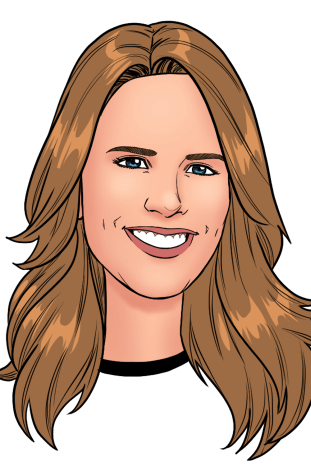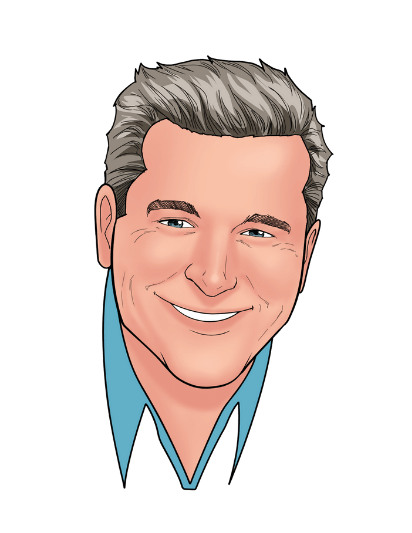
115
Episode 115 43 mins
Focus On the How, Not Just the What: Creating an Uplifting Environment to Scale
Mychelle Mollot, Chief Marketing Officer at Solace
00:00
00:00

Leaders have to let people know that what they do is really important, obviously, because that's the essence of how we contribute to an organization. But how they do it is not just important, it is equally important. And that as a as a leader, you're going to send a strong message to them that you really measure both equally.
In this episode
Can you coach negative team members to be more positive?
Yes! But lean towards helping them communicate effectively, rather than changing their perspective.
Mychelle Mollot is the Chief Marketing Officer at Solace and has over 25 years of experience as a leader.
On episode 115, Mychelle emphasizes the importance of creating an uplifting environment with all team members.
We chat about how most managers focus on the what and not on the how, and why focusing on the wrong thing can lead to toxic environments.
Tune in to hear all about Mychelle’s leadership journey and the lessons learned along the way!
Like this episode? Be sure to leave a ⭐️⭐️⭐️⭐️⭐️ review and share the podcast with your colleagues.
04:36
Transitioning from IC to manager
12:15
Experience versus attitude
19:09
Managing disruptive team members
29:20
Biggest alignment disrupter
35:08
Coaching team members to be more positive
38:30
Knowing when to dive deeper
41:00
Keep learning and moving through hard things
Resources
- Follow Mychelle on Twitter
- Read The Hard Thing About Hard Things
- Listen to our interview with Colin Bryar, Former VP of Amazon
Transcript
Aydin Mirzaee (Fellow.app) 01:19
Mychelle, welcome to the show.
Mychelle Mollot (Solace) 03:48
Thanks, Aydin. It’s great to be here. Yeah, really excited to
Aydin Mirzaee (Fellow.app) 03:51
do this. You and I have known each other for quite a while. So it’s always fun to do this with someone that that I actually know. And yeah, so I mean, you’ve had a pretty extensive leadership career. You’ve been at IBM and Cognos and Klipfolio. Today, you’re the chief marketing officer at solace. You’re definitely one of the people I look up to in the world of marketing. So this is always fun. But also you’ve held various senior roles in marketing too. So I think from as we know, the more senior roles get, it’s all about the people, people people. So let’s start from the beginning though. So the very, very beginning Do you remember when you first started leading a team and what were one of those cringe worthy mistakes that maybe you made back then?
Mychelle Mollot (Solace) 04:36
And so many mistakes? Just think back to the beginning of my career when I was first managing and, and I cringe at all the mistakes but I mistakes I think, to categorize mistakes are sort of transitioning from single contributor mistake. So my first management job was in product marketing. It’s just a couple of people, but I’ve been a single contributor and product parking. And now he’s going to be managing. So it’s making the transition from being a single contributor where it’s all on your shoulders and you’re digging into your domain to now I have to manage people, but like most people who get their first management jobs, I’m not a pure manager, I’m a, I’m a worker manager. So I would try to balance being a manager and being an individual contributor, and I always lean towards individual contributors. So I, that’s where I put my energy and learning that no, that was just as a manager, now you have to start thinking about the people. And then the other thing was thinking about all the mistakes that I made, trying to direct people, because I figured, when I’m as an individual contributor, I’m doing all the work. So I’m planning it, I’m directing it. And as the leader, my first instinct was to do that my team, tell them how to do everything, instead of just telling them why we were doing things, and then letting them go. So, so many mistakes, and and they were usually in that category of transitioning from individual contributor to being a manager, and a leader and a setter of direction.
Aydin Mirzaee (Fellow.app) 06:09
It’s very interesting. So when looking at the all the answers that we’ve gotten to that question over the course of time, it’s very interesting, they fall into a few different categories. And this certainly is one of them. And especially when you have someone who’s really great at being an individual contributor, what allows you to make that shift? Because it is really hard. And when you’re so good at something, and maybe in the beginning, you may think that your team is not as good. How did you feel comfortable letting them take the reins? Yeah, it
Mychelle Mollot (Solace) 06:41
was really, I think there were epiphany moments, right? Where, you know, I was setting direction for people telling them exactly how to do things. And you just see the light bulb go off right above your head, when you when you realize the person is looking at you like, I got this, I know how to do this. I’m like you I’m an individual contributor. And then I just remember, I really remember the face of one of my employees, just giving me this look of complete, almost disdain, like, what are you doing? You know, I don’t need this from you. And that, for me was a real kind of forcing function to go off and actually think about management as a skill. Because before that, I don’t think I really thought about it as a skill. I just thought about it as a position. Oh, I’m an individual contributor. Now, I’m a manager, I didn’t realize at the time being young. And my first management job was in my early 20s. And I didn’t know anything about management. So I realized I had to learn what this is. And as soon as I started learning about it, then I realized just how bad I was. And that’s what made me change, you know, it’s actually asking people, okay, well, you’ve been a manager at this company for eight years, tell me what you think is important for a manager and then hearing them go through their list and going, Oh, I don’t do that. And I don’t do that. And I don’t do that. So it was really it was that person watching their facial expression, forcing me to reflect, then me going out and asking the people in my network that made me realize that I needed to change, and I needed to change fast. And then once I started on that journey, I never stopped. Because to me, it’s just, it never ends. Because you’re never a great manager, you’re only a manager in an improving manager, you know, because times change. So what was great a year ago is not great anymore.
Aydin Mirzaee (Fellow.app) 08:26
You know, I think some of these things are sometimes easier to do when you are managing an area where you know that you don’t have a lot of expertise. And so you know, let’s say it’s some random part of marketing, like email marketing, and you hire someone who truly is an expert, and you know that they’ve been doing it for longer than you and they’re better than you. It’s so much easier, I think, to just say, yes, please go ahead. No micromanaging here. But then when you feel that you’re, you’re the expert in a given area, and you start to see maybe progress, and maybe it’s, you really see the differential between how you could have done it, and that member of the team can do it. How do you hold yourself back from? I think it’s still challenging, like, is there a tactical way to go about this?
Mychelle Mollot (Solace) 09:13
Yeah, I think there is a really important switch, you have to throw, you have to throw the switch that says, I’m not a manager, right now. I’m a coach, because when you’re the person that has the expertise, you can just do it yourself faster. And I would say early in my career, I did too much of that, you know, just okay, I’m just going to tell you how to do it because I’ve done this 100 times. But if you do that, obviously, you know, you’re you’re not teaching them to fish, you’re fishing for them the old saw. So I think you have to throw that switch. You have to say now it’s time for me to be a coach, I have to be patient. I have to give them the skills I have to help them develop and not do. It is hard, but you have to do it and it is literally a switch. I’m moving from management to coaching.
Aydin Mirzaee (Fellow.app) 09:58
Yeah, I think that’s a very, very good point and that that really clarifies it, I did want to talk about the role that you have at solace. But maybe as a backdrop, you held a pretty senior role at IBM, which is a gigantic company. And, you know, very different than maybe the role that you joined when you were at solace, where the team was only six people when you joined, and now maybe it’s 40 or 50? People? What were some of the things that you thought about when learning how to scale that team from such a small team to the larger team that it is today,
Mychelle Mollot (Solace) 10:33
the first thing I thought about was the ideal state. So you know, I had to think through the ideal state for the state of the company, because at IBM, now the matrix organization that I had was over 200 people across the world. So you have the ideal situation in a lot of areas, right? So then I had to think through what was what would be the ideal end game for us within a certain timeframe. So that’s step one, then when I did that, then it was, okay, how can I scale in a way that will allow me to have scaling people, so meaning, you don’t want to just get the individual contributors and not have any thought to who can lead? So part of my thinking was, how do I build an set of leaders that can then help me scale and help me scale fast? Because we, you know, we were really small, six people, for an organization, the size of solace, that has offices around the world, and a massive enterprise sales team was nowhere near enough. So we had to scale fast. But we also had to scale the tech, we had no foundation, very little technology, no marketing processes. So we had a lot of areas to scale. So, you know, it was thinking through all of the areas we had to scale, how can we get people in place to help me scale them? And that would probably be step one, getting the people the right people to help scale? Because that if you don’t have that, then you’re just can’t You can’t move forward fast?
Aydin Mirzaee (Fellow.app) 12:02
Can we dig in on that a little bit? When you say the right people to scale? Are you talking about the people who have the leadership skills to be able to scale? And how do you how do you find that? Or what do you look for?
Mychelle Mollot (Solace) 12:15
For me, I look for aptitude and attitude? You know, I don’t I don’t actually look for people who have always done it before I look for people who have that I will learn anything mentality. And I can do anything mentality. No, just that sense of, yeah, I’m going to figure it out. I’m just going to push through walls. And I’m just going to go until we get it done. Because there’s so much available now to learn. You know, we don’t need people who have the extra if they have the expertise is great. But we don’t always need them to have the expertise. But we need them to have the attitude that yeah, this is going to be hard. But if you if you have the attitude that I can do it, I can move the mountains, then they’ll get it done. But if they have this expertise, but don’t necessarily have that aptitude or attitude, then they’re not going to be any more successful than somebody who doesn’t have the expertise. To me, that’s most important skill. So then look for that skill, and then in combination with some level of experience, right, that’s the ultimate person. But I’ve had too many people come on board who had experience but not the right attitude. And I think it is the hard things that prevent people from being successful. Because as you know, scaling is hard. And you have resource constraints, you have people constraints, you have budget constraints, you know, there’s and you have unbelievable massive expectations for growth at the same time, right. So that’s hard. And if you get people who are too used to having all the resources that they need, having all the people that they need, having all of the plans laid out, you’re never going to scale, you got to get that attitude of I can do it. I can do anything. If you give me time, and money and people
Aydin Mirzaee (Fellow.app) 14:02
since you’ve hired a lot of people, what do you do to look for that attitude? Is there are there series of questions you might ask in an interview? Do you look for certain things in a background check? What do you look for?
Mychelle Mollot (Solace) 14:14
I get into conversations in my interview. So I start with just talk about who you are, what you’re passionate about some of the things that you’ve done in your life that have been difficult, how you’ve gotten through them, not even work related, necessarily, but just getting a sense of the person’s kind of inner fortitude, you know, what’s their drive, and that’s a big part of the interview. Then I get into the skills and dig into their know what they know. And then lastly, I finished with their learning mentality, you know, how do they see learning is an important part of their development because I think if you come in as a learner then then you can get the skills that you need, but if somebody is used to being spoon fed everything that They know, they’re not going to be good for an environment where there’s a lot of growth needed. It seems
Aydin Mirzaee (Fellow.app) 15:05
like learning is a really important one. What do you ask them to kind of get to understand if they are learner or not?
Mychelle Mollot (Solace) 15:13
I ask about what they’re listening to, from a podcast perspective, what are they reading? What did they learned on the job? What blogs? Do they go to? Who do they follow as influencers? And if they can’t answer any of those, then they’re not a learner. They’re consumer. And some people literally can’t give you a single podcast, blog, influencer or book. And to me that that says that’s not a bad thing. It’s just not something that I look for. I want people who were actively searching knowledge all the time for their area, their domain, bringing it to our company, staying current,
Aydin Mirzaee (Fellow.app) 15:51
that makes no sense. What are your thoughts on just take home tests? And do you do that? I think maybe some of these things are possibly easier for more junior roles. But when you get more senior, do you also consider that a useful tool?
Mychelle Mollot (Solace) 16:06
No, no, I, I mean, I could see take home tests for certain technical functions. And we’ve certainly done it in the past, and certain roles for some of the more technical marketing functions to check the aptitude, the you know, the do they really have the skills, but I think you can suss that out a little bit in the interview anyway. So if you’re interviewing for marketing automation, you can say, okay, whatever tool you’re using Pardot, and Marketo, walk me through how you would actually set it up. And if the person can’t do that off the top of their head, they don’t know the tool. So you can give them a take home exam, which they can cheat on, frankly, or you can see how they what their recollection is. And that’ll tell you how close they are to the tool. So we don’t have the luxury of anybody who manages purely, so all of our managers or player coaches. And so we ask them those kinds of practitioner questions because they need to be able to be in the tools no matter what level they are, myself included, I don’t exclude myself from that.
Aydin Mirzaee (Fellow.app) 17:10
So on this note, but just going back to this scaling aspect, so what have you found to be different between managing someone who is an individual contributor, and then managing managers, and maybe how you spend your time with them, and how you coach them what’s different about those two scenarios, or how you might play them.
Mychelle Mollot (Solace) 17:32
So I’ll give you an example we have, I have a couple of individual contributors. So I am an analyst relations professional, super senior CS and I think he’s the best in the industry. And in but he isn’t a complete individual contributor. So when I manage him, it’s all about, I don’t have a lot of value to add to his domain. I know his domain, because I actually did analyst relations early in my career, but he’s far surpassed anything that I had done. So for me, it’s more just about discussions, allowing him to ask me for help with things for me giving, you know, maybe the audit pieces of advice in terms of the strategy that can help coach them, but it’s more check ins, and, and roadblock, elimination. Whereas the people that I have that are coaching, I spent a lot of time and managing and leading, I should say, I spent a lot of time with them on the people side of things, because I think that is the most difficult part for most people. So coaching them through dealing with performance issues, or personality clashes or alignment issues, that kind of thing. So it’s completely different interactions.
Aydin Mirzaee (Fellow.app) 18:40
And then, you know, relating to because we talked about this a little bit, and maybe we touched on it during a little bit when you were talking about interviewing and how to do that. One of the things that I know you care a lot about is people just paying more attention to how people do things versus what people do or what they do. I would love for you to maybe elaborate on that. Like what the difference is and why you think people should focus more on the how,
Mychelle Mollot (Solace) 19:09
yeah, I think when you ignore how people do things, and pay only attention to what they do. So high performer contributing to the business, whether it’s a coder or marketer doesn’t matter. Everybody has these star athletes on their teams that are frankly, disruptive to the company. They’re assholes maybe in their, in their interactions with people. They are bullies. In some cases, there’s all kinds of different types prototypes, but those types of interactions can be very cancerous to the organization because first off, it takes the air out of the room when you have somebody who’s bullying or who’s behaving that way. And that means that other people are contributing their true thoughts, right, they tend to shut down then you lose the value of the room. You Lose the value of all of these people’s knowledge, input insights, and then that person ends up getting a lot more airtime their contribution carries a lot more weight. And I think over time, it also makes the other people believe that it doesn’t matter how you behave, you’re still going to move forward in this organization. And that’s a bad message to sin. So I think you have to nip that in the bud right away. No, you have to let people know that what they do is really important, obviously, because that’s the essence of how we contribute to an organization. But how they do it is not just important, it is equally important. And that as a leader, you’re going to send a strong message to them that you really measure both equally. And that it doesn’t matter how much they contribute, if they don’t behave properly in a collaborative way, in a productive way, in an, in a way that enables other people to be their best selves to, they’re not going to be rated highly in the organization, and they’re going to have to change. So that’s how I feel about that situation. I’m really passionate about it.
Aydin Mirzaee (Fellow.app) 21:06
Yeah, it’s interesting, the term brilliant jerk is often thrown around in describing these sorts of individuals. I guess my question is, you’ve seen a lot of different types of people. And you’ve certainly seen people in this category, is it possible to turn them around, or very often, you just have to part ways,
Mychelle Mollot (Solace) 21:24
my experience is that most of them are completely unaware of their behavior. So I’ve seen a few that couldn’t be turned around, but I’ve most can, most just weren’t, weren’t really aware that they were so disruptive. And you know that that’s step one, they have to be told, and they have to be told by multiple people, because sometimes they won’t believe it, because they’re not aware of it. They’re indignant how I don’t like that. And then when you tell them that, and then other people tell them that, or if you do a 360, and show them, look, this is how you’re viewed by lots of people, they can’t deny it. But if you do it in a way that says, I’m not beating you up, I’m helping you remove a negative barrier, from your success to your success in this company, I should say, when you do it in a way that makes them feel like you’re really truly trying to help them versus beating them up for quality that they don’t even see. They’re usually more likely to take the advice, not even advice. I mean, it for me, it’s presented as an ultimatum, you either change this, or we will be managing you out of the business is some of the conversations I’ve had to have. But yeah, I think I would say 70% of them can be turned around.
Aydin Mirzaee (Fellow.app) 22:42
That’s very interesting. It’s almost like you want to hold a mirror up to them so that they can see their blind side. And in a lot of cases, they’re not aware, just to make this super obvious for people, and especially in cases where you’re the person might not be aware, what’s an example of something that someone might do that maybe people who are listening, they might say, oh, yeah, I’ve noticed that behavior. And it is disruptive, is it? You know, something like just debating ideas, or being negative on new ideas being thrown around in a meeting? What kind of behaviors are we talking about?
Mychelle Mollot (Solace) 23:19
I think the two that you just talked about are minor examples, I would say it’s people who don’t understand that their way they communicate is toxic to other people. So instead of just saying, Well, look, I think your idea has some merit, but here are here are areas where I think it could be improved. They just say, No, that would never work. But that’s a stupid idea. I mean, I’ve literally heard that is a stupid idea come out of people’s mouths, right? So it’s often not what they do. It’s how they communicate what’s in their head. And then in some cases, it’s people who actively bypass people, because they they have an agenda. You know, they don’t maybe understand that when agenda. But then so they know, okay, Aydin won’t support this. So Well, I’m just not going to ask Aydin, I’m just not going to bring it in into this project, I’m just going to bypassing because I know agents gonna make it more difficult to get this through. So I’m just going to go to Peter or Paul, who are going to agree to what I’m what I want to do. That’s another example. I think that’s very, very common is sort of the toxic behavior of not including people that should be included because they feel like they’ll get resistance. So there’s a whole bunch of examples of what it can be, but often it comes down to those two patterns. Communication is awful, and negative and damaging to the person or they are bypassing somebody in order to get what they want done.
Aydin Mirzaee (Fellow.app) 24:55
Hey there just a quick pause on today’s episode to let you know that we really appreciate Are you helping us spread the word about the Supermanagers podcast? If you’re enjoying what you’re hearing so far, dial into your podcast app of choice, whether that’s on Apple or Android, or Spotify. And just leave us a quick review. Now back to the interview. So you are right, like I think there are some skills that you can develop to communicate better just talking about the the first situation that you mentioned, we have a board member who does such a good job at this, instead of saying something is, say a stupid idea, they might take the objection that they have or the flaw that they’re seeing. And they might say something like, Have you considered how you’re going to deal with this issue? Or how customers might behave? If they understand this is happening in the product? Right? And then what’s interesting is sometimes we might say, Oh, actually, we thought about that. And this is why we still think it’s a good idea. Or we might say, Oh, that’s really interesting. We hadn’t thought about that. Right? It’s just it’s very interesting, just slight changing in position. But I will say it’s very hard to do. So just some things that I’ve done, which may be a little funny, especially for a design reviews and things like this that we have at the company, sometimes I’ll just have to take a post it note, and I just put it directly on my monitor right next to the Zoom screen. So that remember to ask positive questions. And I’ve had to do things like this to remind myself, it’s a very, very hard thing, but you do get better at it with enough practice.
Mychelle Mollot (Solace) 26:34
I love that idea. I’m going to steal that idea. One of my employees, fantastic guy. But he had, he had that kind of knee jerk reaction, when people would present ideas that weren’t as well thought out. And when we talked about the issue in our management, meetings, non management, sorry, in our one to one meetings, he said, I really want to change. So we developed a process where he asked a few of his peers for help. So he was asking them to virtually kick him under the table like you wouldn’t personally hold Santa. And any ties anytime I do this behavior, I want you to kick me under the table virtually. And it was so effective, because they would you know, they would slack on more whatever the team, they teams with whatever it was it IBM, same time, and let him know, look, you’re doing this, this thing you said you don’t want to do you’re doing it right now. And he got off. And then he would he would, you know, change. So I think there are techniques for the people. But step one, he wanted to change. I told him what the situation was, he was completely surprised. He didn’t know he was doing it. And he was also mortified. He didn’t want to be that person, right? I mean, he knew kind of some little edges of it, you know, he wasn’t completely and self aware. But when I expose the reality of the problem, he was mortified. And then he said, I want to fix this, we put a plan in place. And then other people rallied around to help them. You know, that was fantastic. And he got so much better to the point where when, when I did his 360 A year later, people were effusive about his collaboration instead of oh, he’s you know, he’s awful. So it can really work. But the person has to accept their issue,
Aydin Mirzaee (Fellow.app) 28:30
you reminded me of this, a coach I used to have would describe this, which was, you know, at first, when you get better if other people tell you, you did it again. And then eventually you’ll do it. And then you’ll know that you just finished doing it again. And then eventually you realize that, oh, I’m in the process of doing it again. And eventually you catch yourself before you do it. So it is a process it is depending on how long you’ve been practicing said bad habits, it might be more difficult to address. But yeah, that is that is very, very interesting. One thing I also wanted to ask you about is just things that you’ve done to really rally the troops, get them aligned, get them to understand what the clear goal is, what have you learned about just team alignment goal setting,
Mychelle Mollot (Solace) 29:20
what I’ve learned about alignment is that the most likely derailleur of any project from an alignment perspective is that people don’t fully engage until the 11th hour and the 59th Minute, so you know, you’ll be Hey, I’ve got this project and and here’s basically what I’m doing and you go Yeah, that sounds good, but you’re not really engaged. And then the person goes off, they scope the project further. They even maybe do some POC work depending on if it’s development or marketing, and then they come back with a great reveal And then the great reveal, then you go, Oh, well, I don’t like this. And what about that? And you ask all the questions that you didn’t ask early on, because you weren’t really engaged in that project. So, to me, alignment is a process that has to be planned and scoped and thought about from the beginning. So what I always coach people to do is identify the stakeholders, identify the detractors is, as importantly, the people who aren’t involved in the project, but who if they don’t agree with it can derail it just by saying, Yeah, that’s stupid. And then they say that and then the person goes, Oh, that stupid thing. And then is that a stupid thing? And then is that a stupid thing? And then next thing, you know, a bunch of people are questioning it, who aren’t even involved in it. Right? So you identify the detractors, and then early on, you really force the stakeholders and the detractors to be engaged and to get all their issues out. And one of the ways to do that is to ask them proactively. Okay, so based on what I’ve just talked about, where do you stand in terms of supporting this? Maybe not the word supporting depending on who the person is? But where do you stand on a scale of one to five, and five being? I love it, I think this is going to be really valuable to the business zero being no, I’m going to put my body on the tracks and three being Yeah, no, I think there’s some issues, but I think it’s a good net net, and ask them. And then when you ask them that, then all sudden, they go, Oh, can I really have to think about and they engage, and then you can start probing them and asking them the right questions. But I find too many people, when you ask them early on, they don’t really engage enough to give you the meaningful feedback. And then by the time they do, it’s too late to change, because you’re almost ready to deliver. And that’s when you get your most negative and ultimately valuable feedback is in that last mile, you know, so that’s just a technique that I’ve used to help the teams come to alignment.
Aydin Mirzaee (Fellow.app) 32:01
That’s a really clever scale. And I can see how it works. Because if you ask them to rate something, then they will have to think about it more. Whereas otherwise, you might just passively consume the information. And I can find myself being here as well. And one of the things that I’ve realized is that, especially in a remote world, now, just having things written also can help increase engagement, I’m just thinking about my own engagement, it’s easier to pick something apart or provide feedback when you see it in written format, even if it’s, you know, one page or maybe two pages. So I found that this is also a really good approach. Now, if we tie the writing plus the zero to five scale, now we’re talking that sounds super powerful.
Mychelle Mollot (Solace) 32:48
I love what you’re saying about the writing because a deck, a PowerPoint deck, it’s the voice over that really brings it to life. And that’s what you capture in the narrative. So I agree, I think a narrative either a summary after you have the meeting or before firmly where you can give people the actual thoughts in your head. Yeah, I love that.
Aydin Mirzaee (Fellow.app) 33:09
It’s very interesting, because I want to kind of bring this back to the what we were just discussing. So my brother and I have been working together for I don’t know, maybe close to at 1820 years long time. And you would think that by now, we would really understand each other very clearly. But very often we’ll get into an argument. And what I’ve realized is that if it’s an argument, and nobody seems to be making progress, then we will say, okay, like, let’s take out a whiteboard and draw for me what you’re saying it’s very often product related discussions. And when he draws it, or when I draw, we find out that we were arguing about different things. And it’s very surprising that that still happens. But what we find is, again, it’s kind of like the equivalent of writing something out. So I think that this is very clarifying. But to tie this back to the the original thing that we were talking about, about having some people that may derail ideas, what are your thoughts on just different personas, and not necessarily trying too much to resist someone’s personality? And here’s what I mean by this, some people are very much naturally creative people. So I thrive on seeing all the good in something. So you’ll come to me with an idea. And even if it’s a bad idea, I might say something like, oh, but if it could work, then it could be like this. And then we could do this. And then all of a sudden, it seems amazing to me. And so we have other people that are the opposite of that. So when they first see an idea, the first thing that they see is all the problems with it, and all the reasons why it won’t work. And so sometimes these two personality types can really clash. And so in a brainstorming session, if you have the personality that sees things are wrong, they might come across everybody else as being potentially a jerk, but it’s just the way that their personality works. So what are your thoughts on that? Like, should we turn everybody into the positive and building on ideas, or
Mychelle Mollot (Solace) 35:08
I don’t think I’ve come to the right conclusion on that one in my career, but I’ve seen it over and over again. And I guess, I lean towards more, trying to help that negative person, not necessarily change their negative viewpoints, because there, we need those people, because they’re the ones that identify all the risks that us super optimists never see. But it’s more teaching them how to more effectively communicate them. So they don’t sound like they don’t see any positive. Right. So I think the coaching I’ve given to people like that in the past is, before you move to that, force yourself, to focus on what are the things that you see about this, that that are good, and then move into your list of the things that are not there? Because we need that, you know, we we will deal Pollyannas, if we don’t have people like that in the room. But I think if they don’t if we don’t coach that out of them, it really takes the air to the room. You know what? To have somebody the doctor knows what 100 Don’t know. Right? I mean, it’s just for me, and for other people that have that. The ideas, I find that that just you just you’re ballooned up. And then you’re not really listening to them anyway, right? Because you’re just so deflated, you know, that that’s that they go on almost the attack like, this is stupid, because these 100 reasons, so but I think when you give them some of the tools to stop their brain from going there first forcing them to start with, okay, yeah, here’s some great things I see about that. Now, can we talk about some of the risks, and instead of putting them down as negatives, they put them down as risks. And that changes the conversation because yeah, they are, there are lots of risks. But when you say why something can’t be done, instead of here’s a risk of us doing this. It just changes the dialogue. And it’s less deflating to people.
Aydin Mirzaee (Fellow.app) 37:05
Yeah, I think this is a very good tactical thing, which is for that type of personality to start out by saying what’s good and forcing them? Because if you ask them a question, they’re smart people, they can answer the question. And it’s, it’s really funny, because so we had Colin Breyer, who wrote this book called Working backwards, it used to be a chief of staff type figure to Jeff Bezos. And apparently, Jeff would read these narratives at Amazon, and would be very effective at, you know, coming to insights that other people wouldn’t be able to come to. And so one day, he asks him, how do you do this, where you come up with all these insights, and other people don’t? And he says, Well, when I read the narrative, my default assumption is that this is false. And then I tried to prove to myself why it’s true. And it’s very interesting, right? And so I’ve thought about that, in my own sense. And I’ve said, Well, it’s funny, because when I read a narrative, my default is this is true. So then I asked myself, Why could this be false, but it’s very similar to your tactical use of starting someone with what’s good. So I think maybe applies to both cases, you can also for the other person, give them a tool of what could be a risk here. So now you’re
Mychelle Mollot (Solace) 38:18
right, that’s equally as important because so often you will get a plan from somebody and it is 100% devoid of any risk assessment. Right? And that’s not useful as well.
Aydin Mirzaee (Fellow.app) 38:30
Yeah. So one thing that I did want to ask you because I think you are in this position very often where you’re presented with plans, people come to you with plans and you really have to understand where you need to dive deeper into understanding something or where you can see at the high level, like, you know, basically the 10,000 foot view versus the Zoomed In View, how have you figured out or you know, when you should use each skill and you know, just how you think about that today?
Mychelle Mollot (Solace) 39:03
I am very driven by my gut on that. My gut is what leads me to ask the questions in depth and if if something doesn’t smell right to me doesn’t feel right then I dive deep and I’ll go as deep as I need show me the tools show me this right inside the system if it doesn’t feel right, if it feels right then I try to fight my my desire to understand more and continue to you know, trust in the team. But if something doesn’t feel right, I always dig deep. And you know, a few times my dad has been wrong but mostly because I’ve been doing this for so long. You learn patterns of gaps in logic that make you go now something that not right there and I’ve learned to not ignore those because that’s really bad. Right if you if you realize afterwards Yeah, I thought there was something not right there and you realize later yeah, that was there was a huge huge gap in that plant under that logic, you don’t want to have to regret that. So it’s better to dive deep at that time, even if it means you get to the bottom, and there’s no issue than it is to ignore it.
Aydin Mirzaee (Fellow.app) 40:11
Yeah, that’s super interesting. You know, both relying on your gut, which is, I think, is a skill that you can develop over time to notice the feeling and actually act on it. But it’s very interesting that you also say that if you want to learn something, but your gut says it’s okay, you will leave it pass. So you’re not diving deep on everything? I think that’s, that’s super interesting. So Mychelle, we’ve talked about a lot of different things today, I mean, very wide ranging conversation. And we’ve talked about, you know, focusing on how people do things, versus only on what we’ve talked about interview skills, how to get people more engaged, and get by and relying on your gut. And the final question that we like to ask from everyone on the show is, for all the managers and leaders constantly looking to get better at their craft, are there any final tips, tricks, or parting words of wisdom that you would leave them with?
Mychelle Mollot (Solace) 41:01
I think two things. One is always keep learning. I’ve been doing this for so long, and I learn almost every, every week, some little new trick tip, or I rediscover something that I used to do regularly that I’m no longer doing. So I would say just continually treat this as a craft, that you’re never really going to perfect. And that’s okay. Just keep on trying. The second thing is one of the books that I read, oh, I don’t even remember how long ago was, I go back to because I think it’s critically important. It’s called the hard things about hard things. Ben Horowitz and I think hard things are the learning to be a piece with hard things is an important skill. Because management is hard business gets really hard at times, and you have to kind of just have the confidence to just plow through and keep on going and not let things overwhelm you. And also let go, you know, let go of the things that aren’t as important and understand you’re not going to be perfect. And there’ll be times when your inbox is really full, and there’ll be times when you’re not doing a great job. And that’s okay, you know, you have to you have to be able to move forward. And if you if you allow every little failure and every little thing to pile up and prevent you from moving through the hard things, you’re not going to be successful. So, man, I found that book really helpful, because that’s what it talks about is how to how to deal with hard things head on.
Aydin Mirzaee (Fellow.app) 42:30
That’s great advice and a great place to end it. Mychelle, thanks so much for doing this.
Mychelle Mollot (Solace) 42:35
You are welcome. It was a great conversation. I really enjoyed it.
Latest episodes
-
Joe Militello, Chief People Officer at Pagerduty: Why You Need to Rethink Your People Strategy
Episode 188
Joe Militello
-
Creating Cohesion: The Art of Connecting the Dots in Team Dynamics
Episode 181
Tonille Miller
-
Diagnosing Gaps and Building A Digital Mentor: Using AI to Spot Opportunities for Growth
Episode 179
Q Hamirani
Management insights straight to your inbox.
Join the Supermanagers TLDR newsletter and become a great leader.
Wait! Before you go!
You might also be interested in these podcasts
-
Episode 113
Why Creating Systems of Continuous Feedback Is a Requirement to Scale
Bilal Aijazi
CEO and Co-Founder of Polly
-
Episode 138
How to Leverage The Art of Feedback to Transform Your Career
Raj Sarkar
Startup Advisor
-
Episode 60
Managing Strengths to Scale: Why Hyper-Specialized Roles Are Key to Driving Growth
JP Chauvet
President of Lightspeed
-
Episode 181
Creating Cohesion: The Art of Connecting the Dots in Team Dynamics
Tonille Miller
Founder of EXT and Author of “The Flourishing Effect”
-
Episode 2
How to Motivate and Develop Your Team
Sara Varni
CMO at Twilio
-
Episode 141
Is What You’re Doing What You Should Be Doing? Absolute vs. Relative Decisions
Jon Fasoli
Chief Product Officer at Mailchimp
-
Episode 49
Efficient One-on-Ones and Diligent Hiring: How to Become a Trustworthy Manager
Mark Horstman
Co-Founder of Manager Tools
-
Episode 140
How Do You Think About Time? The Psychology of Value per Hour and Getting More Done
Nick Sonnenberg
Founder of Leverage
-
Episode 162
Beyond the Bad News: Leading With a Plan of Action and Assurance
Carol Leaman
CEO at Axonify










